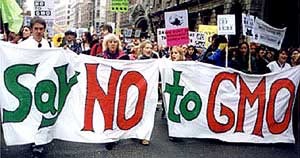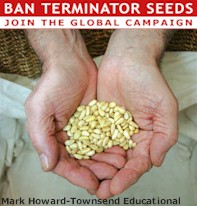
I have been skeptical of the whole organic trend. I felt that government regulations and and scientific testing would protect me for anything harmful. I thought that those CoOp crazies were just jumping on a bandwagon, just like many do with fad diets, to create an upper class of food. After doing some research after watching the documentary called, "Future of Food" it turns out that the the rabbit hole is deep when it comes to food production. I realize that I one of the last to learn about all this but just in case there are other stubbern people like me out there I have complied this list of just a few reasons why you should pay attention to what you eat.
REASON #1: The Cooperate ownership of nature. For centuries—millennia—farmers have saved seeds from season to season: they planted in the spring, harvested in the fall, then reclaimed and cleaned the seeds over the winter for re-planting the next spring. Monsanto has turned this ancient practice on its head.
For centuries—millennia—farmers have saved seeds from season to season: they planted in the spring, harvested in the fall, then reclaimed and cleaned the seeds over the winter for re-planting the next spring. Monsanto has turned this ancient practice on its head.
An article in Vanity Fair sums up the history of how cooperations are able to own a seed.
Monsanto developed G.M. seeds that would resist its own herbicide, Roundup, offering farmers a convenient way to spray fields with weed killer without affecting crops. Monsanto then patented the seeds. For nearly all of its history the United States Patent and Trademark Office had refused to grant patents on seeds, viewing them as life-forms with too many variables to be patented. “It’s not like describing a widget,” says Joseph Mendelson III, the legal director of the Center for Food Safety, which has tracked Monsanto’s activities in rural America for years.
Indeed not. But in 1980 the U.S. Supreme Court, in a five-to-four decision, turned seeds into widgets, laying the groundwork for a handful of corporations to begin taking control of the world’s food supply. In its decision, the court extended patent law to cover “a live human-made microorganism.” In this case, the organism wasn’t even a seed. Rather, it was a Pseudomonas bacterium developed by a General Electric scientist to clean up oil spills. But the precedent was set, and Monsanto took advantage of it. Since the 1980s, Monsanto has become the world leader in genetic modification of seeds and has won 674 biotechnology patents, more than any other company, according to U.S. Department of Agriculture data.
To date, Monsanto Corp. has filed 90 lawsuits in 25 states involving 147 American farmers and 39 small businesses or farm companies.
Monsanto has set aside an annual budget of $10 million and 75 full-time staff devoted solely to investigating and prosecuting farmers.
The largest recorded judgment favorable to Monsanto documented by the report was $3,052,800
Monsanto has received $15,253,602.82 in total recorded judgments to date.
According to the report, Monsanto's efforts to prosecute farmers fall into three categories: investigations of farmers; out-of-court settlements; and litigation against farmers accused of patent infringement or "breach of contract."
Companies that patent genetically engineered seeds own the right to the technology contained in each seed. Farmers who purchase genetically engineered seeds must sign Technology Use Agreements that specifically shield the patent company from liability for accidental contamination or other adverse impacts. The effect of these agreements is to pit farmer against farmer when conflicts arise.
The Farmer Protection Act (SB 218) aims to shield Montana wheat farmers from undue liability for genetically engineered wheat damages. The bill would also prevent patent-holding companies from suing farmers for patent infringement if genetically engineered wheat drifts across property lines and is found on the land of farmers who did not intentionally grow it. [January 13, 2005]
REASON #2: Cooperate Greed and Monopolies
Monsanto genetically engineered seeds called Roundup ready seeds. This allows those seeds to survive being spayed with the herbicide Roundup.
Farmers who buy Monsanto’s patented Roundup Ready seeds are required to sign an agreement promising not to save the seed produced after each harvest for re-planting, or to sell the seed to other farmers. This means that farmers must buy new seed every year. Those increased sales, coupled with ballooning sales of its Roundup weed killer, have been a bonanza for Monsanto.
REASON #3: Small Farmers
This radical departure from age-old practice has created turmoil in farm country. Some farmers don’t fully understand that they aren’t supposed to save Monsanto’s seeds for next year’s planting. Others do, but ignore the stipulation rather than throw away a perfectly usable product. Still others say that they don’t use Monsanto’s genetically modified seeds, but seeds have been blown into their fields by wind or deposited by birds. It’s certainly easy for G.M. seeds to get mixed in with traditional varieties when seeds are cleaned by commercial dealers for re-planting. The seeds look identical; only a laboratory analysis can show the difference. Even if a farmer doesn’t buy G.M. seeds and doesn’t want them on his land, it’s a safe bet he’ll get a visit from Monsanto’s seed police if crops grown from G.M. seeds are discovered in his fields.
Examples:
Monsanto Sues Midwest Farmers for Saving Soybean Seeds
Monsanto Prevails in Patent Fight
REASON #4 Genes Designed to Protect Intellectual Property .
The terminator gene is a specific genetic sequence inserted into a seed's DNA. Once activated by a synthetic chemical catalyst of the manufacturer's choosing, the sequence renders the seed and crop it produces sterile. Patented by the USDA and Delta and Pine Land Co., now owned by Monsanto, this terminator technology has no agricultural or economic benefits for farmers or consumers. The only motivation is to protect intellectual property rights, according to owners of the technology. They claim that it allows them to be able to recover investments on research, and produce profits from their technology, as planters must re-purchase seeds every year. Opponents claim that corporations will only use this to squeeze more money out of dependent farmers, and begin a monopoly of chemically saturated suicide seeds.
Possibility of Transfer.
Transgenic plants have already been shown to transfer certain genes to wild relatives or bacteria. The possibility that the terminator gene could be transferred is not denied by anyone. In fact, the tendency of genetically manipulated plants to "leak" traits is greater than others. "They learned that the transgenic plants were 20 times more likely to outcross than the mutants-they were "promiscuous," as a headline in the journal Nature put it. "Nobody knows why," Bergelson says. "We're still trying to find the mechanism that drives the pattern we saw. There's a lot we don't understand, including how common it is." "It's inevitable that they will get out," says ecologist Joy Bergelson of the University of Chicago. "That doesn't necessarily mean that there will be negative repercussions. But there could be some. And right now we don't know enough about what they could be and when they could occur."' There is some speculation on the subject, however, despite the limited empirical evidence. Even if the terminator gene were to spread to wild weedy relatives, then it could help control the spread of genetic hybrids and accompanying artificial traits. "Moreover, if Terminator genes were packaged with other transgenic traits, they could help ensure that crop-weed hybrids would be sterile-potentially eliminating a difficult problem." In fact, some believe that an added attraction to use of the terminator gene is the possibility that it will prevent more genetic transfer from occurring.
While that maybe true. The sterile-seed technologies could spread to unsuspecting farmers’ lands through unwanted pollination. Communities that lose control over their seeds, adapted over centuries to their needs, risk losing control of their farming systems and becoming dependent on outside sources for seeds.
More than a billion people could be impacted by food shortages if poor farmers are not able to use their saved seeds. According to the international Food and Agriculture Organization (FAO), poor farmers cultivate 15 to 20 percent of the world’s food. A recent FAO report estimated that farmers who save seeds feed at least 1.4 billion people in developing countries annually: 1 billion in China, 300 million in Africa and 100 million in Latin America.
The way a plant gene interacts with its environment cannot be completely controlled, according to many scientists. Every grain of pollen engineered with seed sterilization technology that gets picked up by the wind or an insect will carry with it the possibility of contaminating neighboring fields, said Rich Hayes, a spokesperson for the Union of Concerned Scientists, an independent nonprofit of more than 100,000 scientists and supporters.
REASON #5: Stand in Solidarity with those around the world
For the past six years, Indian farmers have experienced the stark realities of GM crop cultivation in the country in the form of Bt cotton. Reports continue to pour in from various districts of Andhra Pradesh including Adilabad, Warangal and Nalgonda on animal illnesses and deaths after grazing on Bt cotton fields. Farmers and shepherds have been reporting the toxic effects of Bt cotton on livestock since 2003 (see Mass Deaths in Sheep Grazing on Bt Cotton, SiS 30). But the regulators continue to rubbish the reports. Farmers and workers experience allergic reactions during harvest of Bt cotton, with scores of victims in different states (see More Illnesses Linked to Bt Crops, SiS 30). However, the governments have not even begun to acknowledge that.
To make matters worse, the ecology of cotton pests has altered drastically and Bt cotton farmers are dealing with newer pests and diseases. Last season’s infestation of mealy bug, a sucking pest, has resulted in pesticides sales shooting up steeply in several states including Punjab.
For farmers who wish to remain GM-free or organic, they find it almost impossible to get non-GM seed. Hundreds of organic farmers are placing special orders directly with seed companies for non-transgenic seed, as it is not readily available from retailers.
It is at this juncture that farmers’ unions, consumer organizations, environmental groups, development organizations and concerned scientists have stepped up their protests against Bt Brinjal, realizing that the experience with Bt cotton cannot be allowed to be repeated, especially with a vegetable crop that is directly consumed by people.
If you want to learn more:
Wednesday, May 7, 2008
Learn More about GMO's
Subscribe to:
Post Comments (Atom)














1 comment:
(sigh)
When are we gonna get a leash for these corporate monsters. I mean it's SO out of control!
Post a Comment